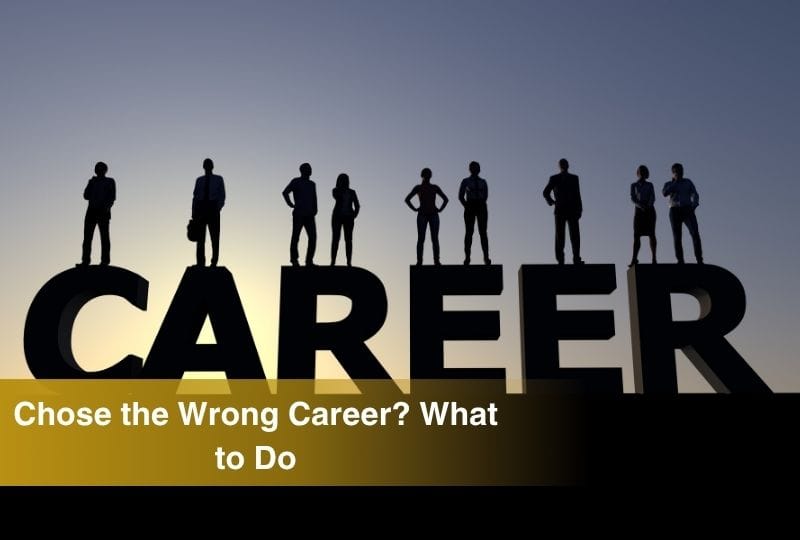Students worry after taking a career path, especially courses just after 12th grade, only to realize they may not have chosen the right one. Whether influenced by peer pressure, parental expectations, or market hype, this fear of being “stuck” is common. The good news: a wrong choice isn’t final. You can course-correct with clarity and confidence. This guide outlines how to assess your situation realistically, explore alternatives, and pivot into a fulfilling path.
Why Students Often Choose the Wrong Career Path After 12th
The transition from school to university is emotionally charged. In many cases, students choose careers that don’t truly resonate with them due to external and internal pressures.
- Peer Pressure & Parental Influence: Many students pursue streams like engineering, medicine, and commerce, not because of interest, but because of expectations. This misalignment often causes regret later.
- Following Trends: Choosing a stream or course because it’s “hot” can lead to dissatisfaction; by the time graduation arrives, the trend may have shifted.
- Lack of Guidance: Career planning is often under-supported. Without counselling, students make emotionally driven, premature decisions.
Signs You May Be on the Wrong Career Path
How to tell if you’ve chosen the wrong course? Watch for these signs:
Lack of Interest & Motivation
If your day-to-day tasks feel meaningless, coursework feels tedious, and you dread going to class, these are red flags that your path may not fit your passions.
Persistent Stress or Burnout
Chronic anxiety, low morale, or frequent burnout—even in the first semester—may signal that you’re misaligned with your chosen stream.
Envy of Other Fields
If you constantly find yourself envious of peers in different streams, perhaps because they seem more engaged or happier, it may indicate that your interests lie elsewhere.
How to Assess If a Career Change Is the Right Move
Self-Assessment Tests
Tools like personality, aptitude, and interest inventories, often available through school counsellors or online, can help reveal strengths and help align your path.
Research Alternative Paths
Collect information on alternative streams or diploma courses. Look at the syllabus, job outcomes, and growth opportunities before making a decision.
Speaking with Mentors & Counsellors
Professionals like teachers, career coaches, or senior students can offer objective advice based on your strengths and trends in the job market.
Steps to Pivot Your Career After 12th
Here’s a step-by-step plan to rebuild your career path with confidence:
Step 1 – Accept & Acknowledge the Situation
First, be honest with yourself. Accepting uncertainty is the first step toward change. You’re not alone; many students face this.
Step 2 – Identify Transferable Skills
Reflect on skills you’ve developed: analytical thinking, communication, basic coding, or interpersonal strengths. Even a wrong course may teach skills useful later.
Step 3 – Research & Shortlist New Career Options
Shortlist fields aligned with your skills, business, technology, arts, healthcare, and design. Look into diploma, polytechnic, or direct-entry degree options.
Step 4 – Enroll in Bridge Courses or Diplomas
Short-duration programs or diplomas in new domains (graphic design, IT, digital marketing) help build credibility and experience for your pivot.
Step 5 – Build Experience Through Internships
Gain exposure through short internships or volunteering in your new area of interest, bridging theoretical learning with practical understanding.
Career Paths You Can Switch to After 12th
Switching streams doesn’t mean starting over. Explore these pivot-friendly domains:
Management & Business
Diplomas in BBA, retail management, or digital marketing offer entrepreneurship skills and exposure to business fundamentals.
Technology & IT
Shorter BCA programs, UI/UX diplomas, or IT support courses can help transition into tech domains quickly.
Creative & Media Fields
Fields like graphic design, journalism, or multimedia can be accessed via diplomas and college programs, ideal for creatively inclined students.
Healthcare & Allied Sciences
Opportunities in Lab Technician, Nutrition, or Physiotherapy diplomas are available even to 12th-pass commerce or arts students, depending on eligibility.
How to Deal with Career Regret Emotionally
Career regret can feel overwhelming, but it’s a common experience. Remember:
- It’s normal to question your path; this can be a catalyst for growth, not a setback.
- Focus on building your story forward, not dwelling on past choices.
- Taking small steps, research, skill-building, and talking to seniors make the transition manageable.
- Think of the pivot as a planned detour, not a failure.
Conclusion
Feeling stuck because you chose the wrong career path after 12th is a valid concern, but also entirely fixable. With purpose, honesty, and guidance, you can pivot confidently into roles that align with your strengths and ambitions. Whether it’s switching to commerce, IT, media, or healthcare, each career change is a growth opportunity. Take control, explore alternatives, and remember you’re crafting your own journey, one step at a time.
Frequently Asked Questions
Is it too late to change my career path after 12th?
No, it is never too late to change your career path after 12th. Many students realise their chosen stream does not suit their interests or goals. Early changes can save years of dissatisfaction. With proper career counselling, bridge courses, and skill-building opportunities, you can successfully pivot towards a more fulfilling direction that matches your abilities and long-term aspirations.
What are the best options after taking the wrong stream?
If you feel you have chosen the wrong stream, you can still pivot to areas like management, IT, design, healthcare, or creative fields. Diploma courses, vocational training, or certifications allow you to switch smoothly. Universities also provide options to shift streams through lateral entry or foundation programmes. Exploring your interests and transferable skills will help you find career options that better align with your strengths and aspirations.
Are diploma courses good for changing career paths?
Yes, diploma courses are an excellent way to change career paths after 12th. They are shorter, practical, and skill-focused, helping students transition into a new domain without investing in a full degree immediately. Popular diplomas in IT, management, hospitality, design, and healthcare enable career shifts. They also open doors for internships, certifications, or higher studies, making diplomas an effective stepping stone toward new opportunities.
How do I explain a career switch to parents?
Explaining a career switch to parents requires honesty and clarity. Share your concerns about your current path and explain why it does not align with your interests or goals. Highlight researched alternatives, career prospects, and examples of successful professionals who changed streams. Parents appreciate practical solutions, so presenting a clear plan, such as diplomas, internships, or higher studies, will make them more supportive of your decision to pivot.
What if I regret my college course after the first year?
If you regret your college course after the first year, it is still possible to change. Many universities allow lateral entry into different programmes, or you can shift through bridge courses and diplomas. Another option is to complete the first year and then reapply for a more suitable course. Discuss your decision with mentors or counsellors to avoid repeating mistakes and ensure your next choice matches your goals.
How can I deal with career regret emotionally?
Dealing with career regret requires self-compassion and perspective. Accept that making mistakes is part of learning. Focus on transferable skills gained and how they can benefit future opportunities. Speak with mentors, counsellors, or peers for guidance and reassurance. Journaling, mindfulness, and focusing on small steps toward a new goal help reduce anxiety. Remember, career paths are flexible, and switching early allows you to realign your aspirations with confidence.
Can online courses help me shift to a new field?
Yes, online courses are an effective way to shift to a new field. They provide flexibility, affordability, and access to industry-relevant skills. Platforms offer certifications in IT, data science, business, design, and more, helping students explore new domains. Completing recognised online courses builds credibility, enhances your resume, and can lead to internships or entry-level roles. Online learning allows you to test interest in a new field before committing fully.


